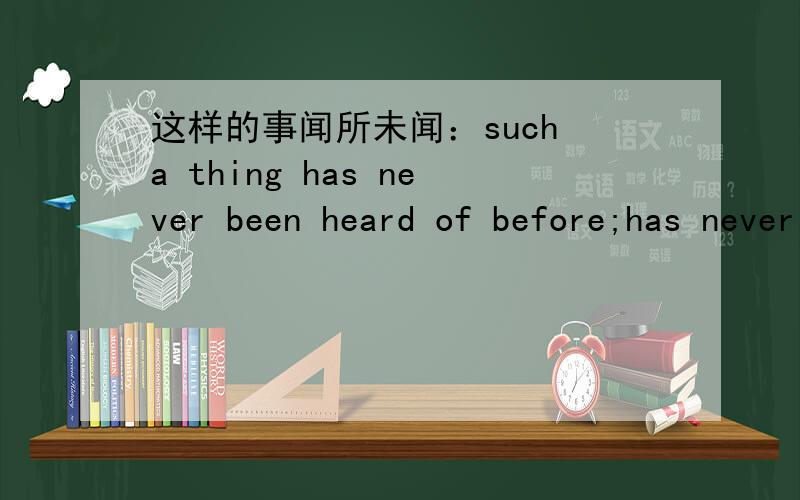这样的事闻所未闻:such a thing has never been heard of before;has never been heard of before 这边谁能解释一下为什么这样用的.如果可以最好对每个进行解释
来源:学生作业帮助网 编辑:作业帮 时间:2024/04/28 13:26:12

这样的事闻所未闻:such a thing has never been heard of before;has never been heard of before 这边谁能解释一下为什么这样用的.如果可以最好对每个进行解释
这样的事闻所未闻:such a thing has never been heard of before;
has never been heard of before 这边谁能解释一下为什么这样用的.如果可以最好对每个进行解释
这样的事闻所未闻:such a thing has never been heard of before;has never been heard of before 这边谁能解释一下为什么这样用的.如果可以最好对每个进行解释
这个是现在完成时态+被动
结构就是has been + 过去分词
因为这是表示这件事情之前从未听说过
是被听说,所以是被动
hear of 听说
看这个句子:
He has never heard of such a thing before.
它的被动式:
Such a thing has never been heard of before.
这里考察的是现在完成时态
现在完成时由“have/has+过去分词”构成,主要有两个含义:
①表示动作发生在过去,但与现在的情况有联系,有时无时间状语,有时和一些表示不确定的过去时间状语连用,如:many times,just,yet,ever,never,already,before,so far, by now等连用。
②表示从过去某...
全部展开
这里考察的是现在完成时态
现在完成时由“have/has+过去分词”构成,主要有两个含义:
①表示动作发生在过去,但与现在的情况有联系,有时无时间状语,有时和一些表示不确定的过去时间状语连用,如:many times,just,yet,ever,never,already,before,so far, by now等连用。
②表示从过去某一时间开始一直延续到现在并还可能继续延续下去的动作,用于延续性动词,且句中常带有表示一段时间的时间状语,如:since + 时间点/从句,for two months, so far等。
二 、1)现在完成时和一般过去时都能表示过去发生过的动作,但现在完成时表示过去动作对现在的影响,并且表示这一动作已完成或还可能继续下去;2)而一般过去时与现在的情况没有联系,仅表示过去的动作,且这一动作到说话时已终止。因此现在完成时不能与表示明确的过去时间如:in1949,yesterday,last week等的状语连用,并且用when或where对这些时间和地点状语提问时,一般只用一般过去时。
三、在“it is first/second...time that...。”或在“it/this/that is the +最高级+名词+that...。”结构中,that从句中的动词常用现在完成时;在“it + be ...+since从句”这一结构中,be可用一般现在时或现在完成时,since从句一般用过去时。have/has/had +been +动词的现在进行时
比较过去时与现在完成时 1)过去时表示过去某时发生的动作或单纯叙述过去的事情,强调动作;现在完成时为过去发生的,强调过去的事情对现在的影响,强调的是影响。
2)过去时常与具体的时间状语连用,而现在完成时通常与模糊的时间状语连用,或无时间状语。一般过去时的时间状语:
yesterday, last week,…ago, in1980, just now, 具体的时间状语
共同的时间状语:
this morning, tonight, this April, now, once,before, already, recently,lately
现在完成时的时间状语
for, since, so far, ever, never, just, yet, till / until, up to now, in past years, always,
不确定的时间状语
3)现在完成时可表示持续到现在的动作或状态,动词一般是延续性的,如live, teach, learn, work, study, know.
过去时常用的非持续性动词有come, go, leave, start, die, finish, become, get married等。
举例:
I saw this film yesterday.
(强调看的动作发生过了。)
I have seen this film.
(强调对现在的影响,电影的内容已经知道了。)
Why did you get up so early?
(强调起床的动作已发生过了。)
Who hasn't handed in his paper?
(强调有卷子,可能为不公平竞争。)
She has returned from Paris.
她已从巴黎回来了。
She returned yesterday.
她是昨天回来了。
He has been in the League for three years.
(在团内的状态可延续)
He has been a League member for three years.
(是团员的状态可持续)
He joined the League three years ago.
( 三年前入团,joined为短暂行为。)
I have finished my homework now.
---Will somebody go and get Dr. White?
---He's already been sent for.
句子中如有过去时的时间副词(如 yesterday, last, week, in 1960)时,不能使用现在完成时,要用过去时。
(错)Tom has written a letter to his parents last night.
(对)Tom wrote a letter to his parents last night.
用于现在完成时的句型 1)It is the first / second time…. that…结构中的从句部分,用现在完成时。
It is the first time that I have visited the city.
It was the third time that the boy had been late.
2)This is the… that…结构,that 从句要用现在完成时.
This is the best film that I've (ever) seen.
这是我看过的最好的电影。
This is the first time (that) I've heard him sing.这是我第一次听他唱歌。
典型例题 (1) ---Do you know our town at all?
---No, this is the first time I ___ here.
A. was B. have been C. came D. am coming
答案B. This is the first time 后面所加从句应为现在完成时,故选B。
(2) ---Have you ____ been to our town before?
---No, it's the first time I ___ here.
A. even, come B. even, have come C. ever, come D. ever, have come
答案D. ever意为曾经或无论何时,反意词为never,此两词常用于完成时。 This is the largest fish I have ever seen. It is / was the first time +that-clause 的句型中,从句要用完成时。
注意:非延续性动词的否定形式可以与表示延续时间的状语连用。即动作不发生的状态是可以持续的。
(错)I have received his letter for a month.
(对)I haven't received his letter for almost a month.
比较since和for
Since 用来说明动作起始时间,for用来说明动作延续时间长度。
I have lived here for more than twenty years.
I have lived here since I was born..
My aunt has worked in a clinic since 1949.
Some new oilfields have been opened up since 1976.
I have known Xiao Li since she was a little girl.
My brother has been in the Youth League for two years.
I have not heard from my uncle for a long time.
注意:并非有for 作为时间状语的句子都用现在完成时。
I worked here for more than twenty years.
(我现在已不在这里工作。)
I have worked here for many years.
(现在我仍在这里工作。)
小窍门:当现在完成时+一段时间,这一结构中,我们用下面的公式转化,很容易就能排除非延续动词在完成时中的误使。
1)(对) Tom has studied Russian for three years.
= Tom began to study Russian three years ago, and is still studying it now.
2)(错) Harry has got married for six years.
= Harry began to get married six years ago, and is still getting married now.
显然,第二句不对,它应改为 Harry got married six years ago.或 Harry has been married for six years
收起
这句话使用的是被动语态,时态为现在完成时。你可以将句子改成主动形式,如: someone has never heard of such a thing before.(因为主动形式的主语不确定,所以用someone代替)“之前从未听说过这件事”,这样你是不是就好理解了,hear of 是固定搭配,听说的意思,后面跟宾语。before 是做时间状语,与heard of 没有关系。...
全部展开
这句话使用的是被动语态,时态为现在完成时。你可以将句子改成主动形式,如: someone has never heard of such a thing before.(因为主动形式的主语不确定,所以用someone代替)“之前从未听说过这件事”,这样你是不是就好理解了,hear of 是固定搭配,听说的意思,后面跟宾语。before 是做时间状语,与heard of 没有关系。
收起